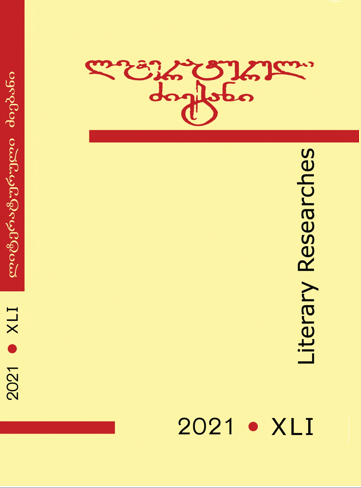Published 2021-12-20
Keywords
- “The Knight in the Panther’s Skin”,
- Arabian Lyrics,
- Nizami,
- Troubadour Poetry
How to Cite
Abstract
The observation of the Prologue and the plot of Rustaveli’ poem “The Knight in the Panther’s Skin” shows, that Rustaveli’s concept of love is a very specific and at the same time absolutely new understanding of love or mijnuroba, which is unknown to the earlier Georgian literature. The Prologue of the poem may be said to play the role of a theoretical treatise shedding light of the essence of love presented in the poem.
The individual details of Rustaveli’s conception of love bear a clear imprint of oriental culture (the most obvious example of this is the reference to the main characters as mijnur, an Arabic word denoting one maddened by love). The suffering of a mijnur is expressed by the secondary motifs, such as: to be maddened by love; shedding tears of blood; burning and flaming with an
inextinguishable flame of love; to be wounded in the heart; dreaming of death; ranging. Each of these motifs is often used in oriental love poetry and epic as well as in the encyclopedic work about the love, such as Ibn Hazm’s The Dove’s Necklace.
Most of these motifs we can observe in European chivalry romances, particularly, in Chrétien de Troyes’ Arthurian romances. Quite possible, that they made their path to Provence by the influence of Oriental (Arabic) culture. It must be said, that this part of France turned out to be a very fertile ground for appearing of a new ideal of Love, named Courtly Love. Love Suffering (as Love Disease) is one of the main motifs of troubadour and trouver poetry, which bears not only oriental, but also Ovidian influence.
These motifs have a function only of given formulas in Rustaveli’s poem and after the literary conversion have absolutely different interpretation.

